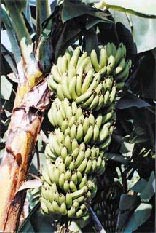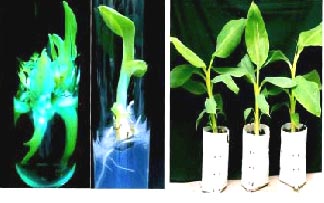Micropropagation of Banana
 Introduction
Introduction
Banana is a globally important fruit crop with 97.5 million tones of annual production. In India, banana contributes 37% of the total fruit production and ranks second in importance next to mango. The state of Maharashtra ranks second with respect to the land under the cultivation but first in its production of banana with 60 T/ha per anum.
Propagation of Banana
 Edible bananas do not produce seeds and are traditionally grown vegetatively through suckers (5 to 10 in number depending on the variety). Thus low rate of multiplication limits this method severely. In the recent years, tissue culture propagation of banana through shoot tip as well as floral aspices has been utilized to increase banana production.
Edible bananas do not produce seeds and are traditionally grown vegetatively through suckers (5 to 10 in number depending on the variety). Thus low rate of multiplication limits this method severely. In the recent years, tissue culture propagation of banana through shoot tip as well as floral aspices has been utilized to increase banana production.
The process involves initiation of cultures from sterilized shoot tips obtained from the parent banana plant, shooting and rooting in the test tube, primary hardening in the laboratory, secondary hardening in the nursery and plating in the field.
Advantages of Tissue Cultured Banana
-
Disease free elite varieties
-
Rapid multiplication & Early harvesting
-
Uniform size and age of plants
-
High quality fruit bunches
-
Available throughout the year
Requirements
-
Infrastructural requirements :
A tissue culture laboratory, A green house or polyhouse facility and an agricultural plot for planting -
Equipment Requirement :
Standard glassware for media preparation and sterilization equipment like autoclave required for a tissue cultured laboratory -
Manpower Requirement :
Two technicians (preferably trained in a tissue culture laboratory) for laboratory work and other ancillary staff. -
Capital Cost :
Approximate cost for setting up of a medium size plant requires around 25 lakhs.